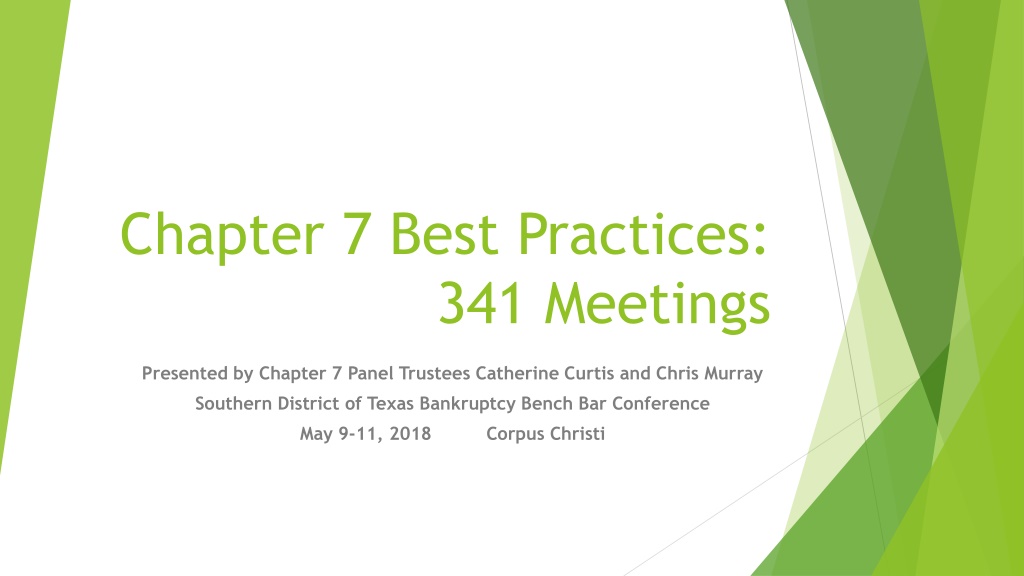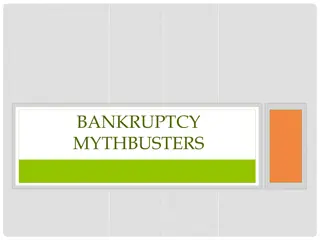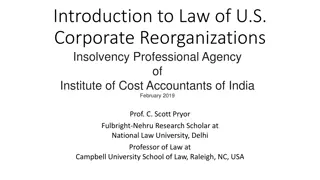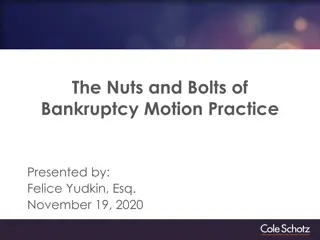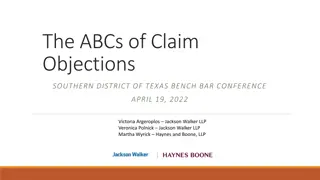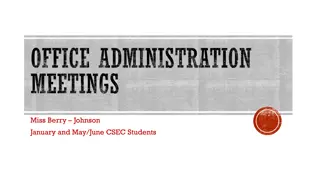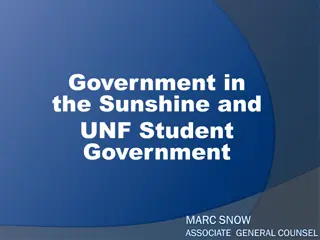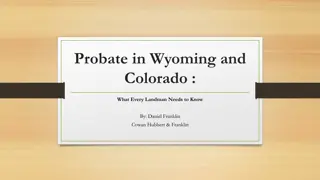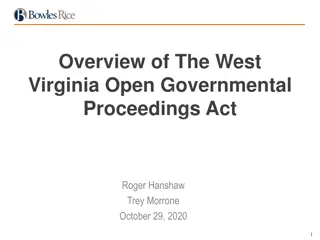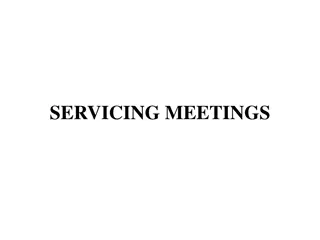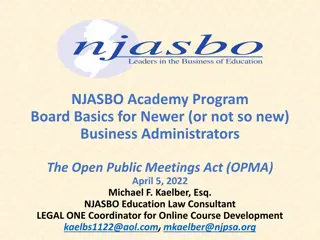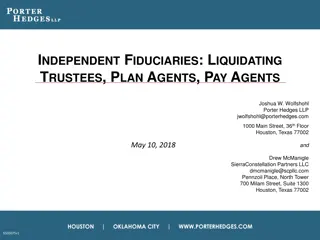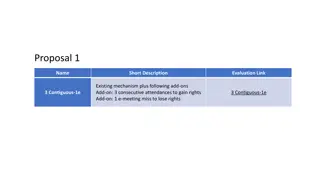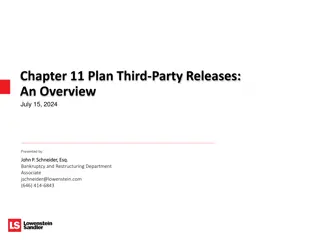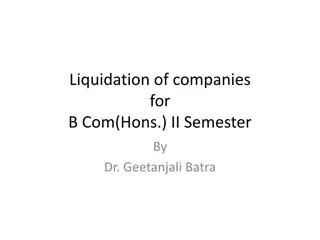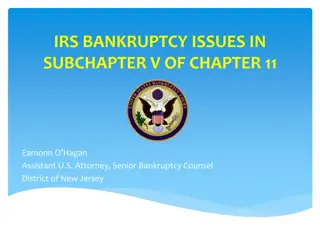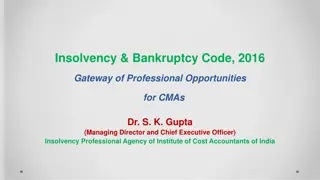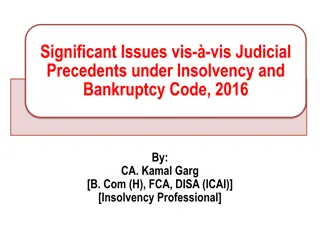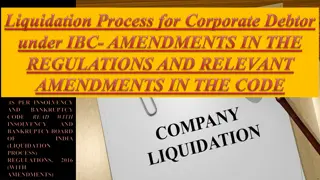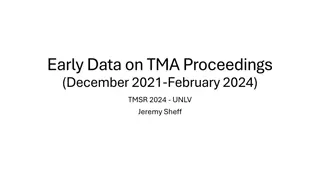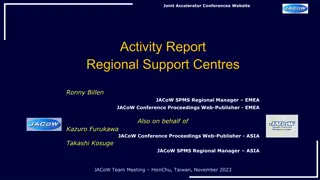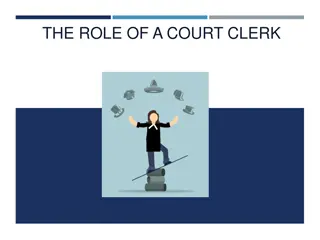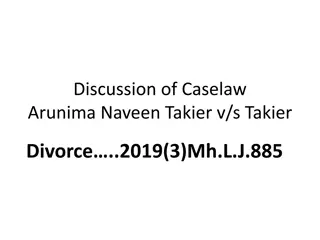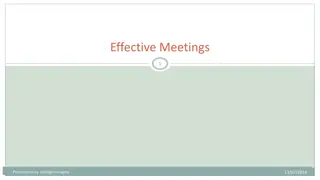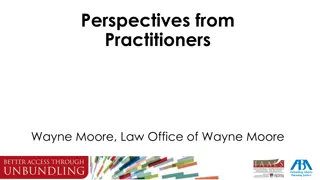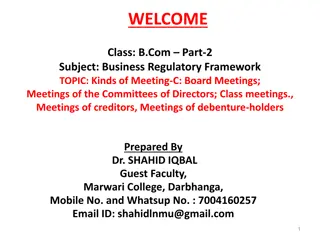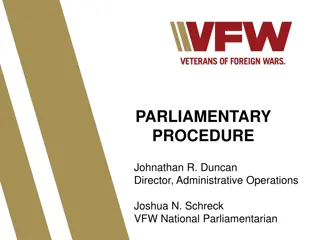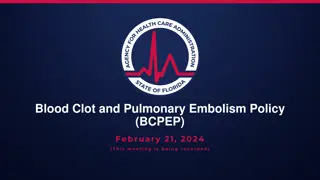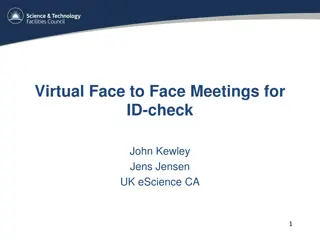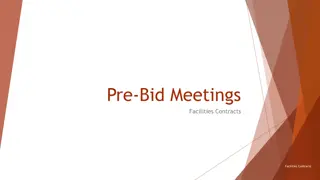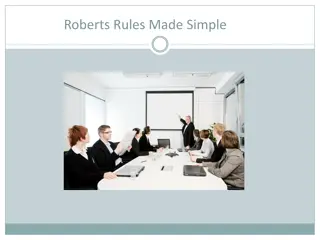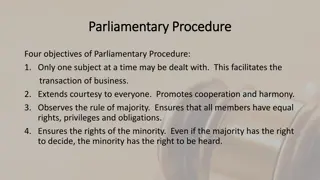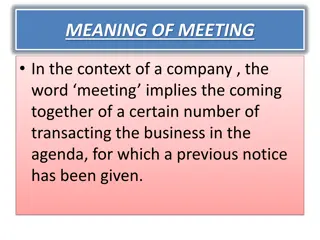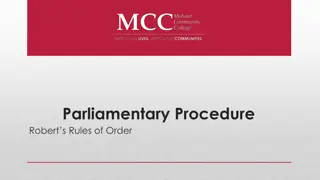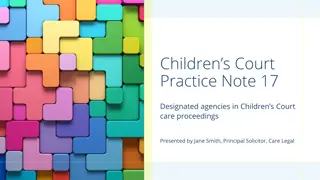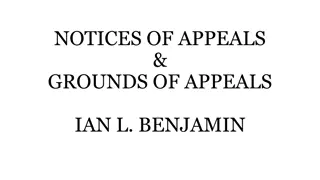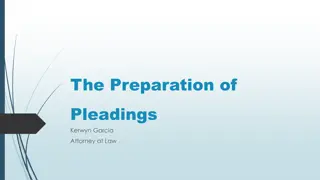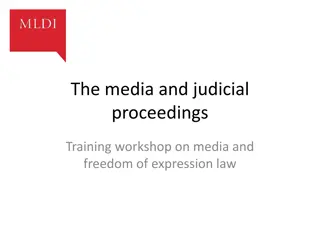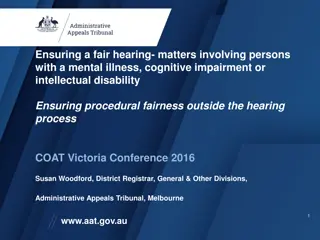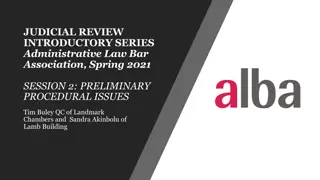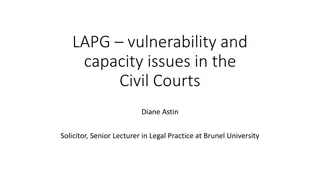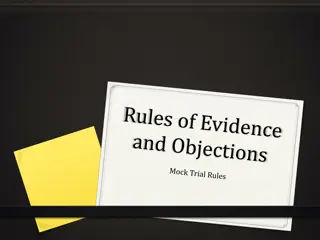Importance of 341 Meetings in Bankruptcy Proceedings
The 341 meeting is crucial in bankruptcy proceedings as debtors must appear under oath to answer questions from the trustee and creditors. Failure to prepare can have serious consequences, and important deadlines stem from this meeting, affecting various aspects of the case.
Download Presentation

Please find below an Image/Link to download the presentation.
The content on the website is provided AS IS for your information and personal use only. It may not be sold, licensed, or shared on other websites without obtaining consent from the author. Download presentation by click this link. If you encounter any issues during the download, it is possible that the publisher has removed the file from their server.
E N D
Presentation Transcript
Chapter 7 Best Practices: 341 Meetings Presented by Chapter 7 Panel Trustees Catherine Curtis and Chris Murray Southern District of Texas Bankruptcy Bench Bar Conference May 9-11, 2018 Corpus Christi
Why is the 341 so important? All bankruptcy debtors must appear and answer questions, under oath, to the chapter 7 trustee and any creditors who attend the meeting Primary opportunity for the trustee to examine the debtor Statements under oath can be harmful if your client is unprepared Important deadlines run from the 341 meeting: 30 days of first setting for the 341 meeting, deadline for the debtor to perform under Statement of Intention. 11 U.S.C. 521(a)(2)(B). 30 days after conclusion of meeting, deadline to object to claimed exemptions (or 30 days after most recent amendment to schedules). FRBP 4003(b)(1). 60 days after first setting, deadline to object to discharge. FRBP 4004(a). The debtor s case cannot be closed until the 341 meeting is closed
Question: What is the specific time frame following the chapter 7 petition for the United States Trustee to set the meeting of creditors?
Answer: Within a reasonable time 11 U.S.C. 341(a) FRBP 2003(a) Between 21 and 40 days after the petition date. But, that can be extended to within 60 days of the petition date if the meeting is to be held at a place not regularly staffed by UST personnel Different rules for other types of cases: Chapter 11: 21-40 days after the petition date Chapter 12: 21-35 days after the petition date Chapter 13: 21-50 days after the petition date
Question: True or False? Once the petition, schedules and SOFA are filed, all the debtor has to do is show up at the 341 meeting
Answer: False! The debtor must also: Perform all of its other duties under 521 of the Code Cooperate with the trustee in the administration of the case, the preparation of an inventory, and the examination of proofs of claim. FRBP 4002(a)(4). Perhaps most importantly for creditors, surrender to the trustee all property of the estate and any recorded information, including books, documents, records, and papers, relating to the property of the estate 11 U.S.C. 521(a)(4)
Question: Name two items all debtors must bring with them to the 341 meeting.
Answer: All debtors must bring with them: Identification usually a driver s license Proof of social security number usually a social security card Alternative documents may be acceptable Check in advance with your trustee to ensure the alternative documents you want to bring will be sufficient
Question: Name the one scenario in which a 341 meeting is not required.
Answer: A party in interest may request that the court order that the U.S. Trustee not convene a 341 meeting or meeting of equity security holders if the debtor has filed a plan as to which the debtor solicited acceptances prior to the commencement of the case. 11 U.S.C. 341(e) (emphasis added).
Question: Multiple Choice If the debtor has limited English proficiency, any of the following may serve as interpreters at the 341 meeting: A. Debtor s counsel B. Debtor s family member, but only if they are also under oath to tell the truth C. The chapter 7 trustee D. A professional, certified translator E. Any of the above
Answer: D: Only a professional, certified translator U.S. Trustee requires the use of an independent interpreter To prevent logistical delays, counsel should advise the trustee if an interpreter will be needed Interpreters are available for every language Debtors will all be treated equally, regardless of whether an interpreter is needed
Question: If the schedules and statements are not filed with the bankruptcy petition, what specific information must the debtor provide immediately to the trustee?
Answer: Under FRBP 4002(a)(3), the debtor must disclose 1. the location of real property in which the debtor has an interest; and 2. the name and address of every person holding money or property subject to the debtor s withdrawal or order Of course, the best practice is to avoid this step by filing the schedules and SOFA with the petition
Question: Name the four questions the trustee is statutorily required to ask during the meeting.
Answer: 11 U.S.C. 341(d): Is the debtor aware of the consequences of seeking a discharge in bankruptcy and the effects on credit history? 1. Is the debtor aware of their ability to file under another chapter? 2. Is the debtor aware of the effect of receiving a discharge? 3. Is the debtor aware of the effect of reaffirming a debt? 4. The United States Trustee suggests several others, and chapter 7 trustees frequently add their own. https://www.justice.gov/sites/default/files/ust/legacy/2012/11/29 /Section_341(a)_Meeting_Questions.pdf
Question: Multiple Choice The 341 meeting may be continued in the following circumstances: Debtor s medical emergency Debtor s family emergency Unavailability of critical documents Any of the above A. B. C. D.
Answer: D: Any of the above, BUT Counsel should inform the trustee immediately upon learning of debtor unavailability Debtors should be prepared to consent to an extension of the deadline to object to discharge Repeated no shows will likely result in the a motion to dismiss the case
Question: True or False? In a chapter 7 case, the debtor has the absolute right to dismiss their case if they do not like the way things are going.
Answer: False! Under section 707(a), the court may dismiss a chapter 7 case only for cause Cause is often based on a failure of the debtor to perform its obligations, such as pay fees But, when the debtor herself seeks dismissal, courts look for bad faith and the potential prejudice to creditors
Question: Multiple Choice Which if the following documents can a debtor get away with not providing to the trustee prior to the 341 meeting? Pay stubs Bank statements Tax returns None of the above A. B. C. D.
Answer: D: The debtor must bring all of them Documents must be provided at least 7 days prior to the 341 meeting. See section 521(e)(2)(A). Waiting until the day of the 341 meeting to provide voluminous documents is a risky proposition, because the trustee will likely be required to continue the 341 meeting so he or she has time to review the documents carefully
Question: True or False? The debtor must provide his or her tax return for the most recent tax year ending immediately before the commencement of the case to the trustee at least seven days before the 341 meeting.
Answer: True . . . but . . . Under FRBP 4002(b)(3), the debtor must provide The return for most recent year that a return was filed, including any attachments; or A transcript of that tax return; or A written statement that the documentation does not exist. a) b) c)
Question: True or False? Once the petition, schedules and SOFA are filed, all the debtor has to do is show up at the 341 meeting
Answer: False! The debtor must also: Perform all of its other duties under 521 of the Code Cooperate with the trustee in the administration of the case, the preparation of an inventory, and the examination of proofs of claim. FRBP 4002(a)(4). Perhaps most importantly, surrender to the trustee all property of the estate and any recorded information, including books, documents, records, and papers, relating to the property of the estate 11 U.S.C. 521(a)(4)
Question: True or False? The debtor has the general right to amend his or her statement of intention at any time before the case is closed.
Answer: False! The debtor may only amend his or her Statement of Intention within the deadline provided in 521(a), which is within 30 days after the first date set for the meeting of creditors.
Key Takeaways: Preparation is key to a successful (and short) 341 meeting Bring required ID and proof of SSN Have clients review their filings in advance Provide documents well in advance of the 341 meeting to avoid continuances Prevent delay by informing your trustee of any special circumstances Debtor unavailability Need for an interpreter Anything else that may require accommodation
